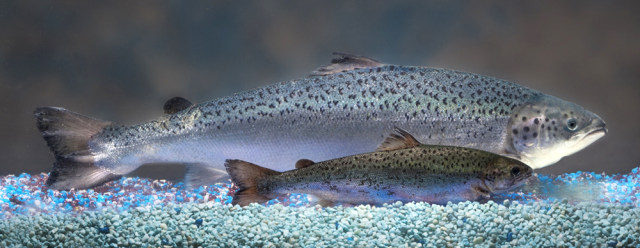A Massachusetts company wants to market a genetically engineered version of Atlantic salmon, and regulators are weighing the request. If approval is given, it would be the first time the government allowed such modified animals to join the foods that go onto the nation's dinner tables.
Ron Stotish, chief executive of AquaBounty, said at Monday's first of two days of hearings that his company's fish product is safe and environmentally sustainable.

Food and Drug Administration officials have largely agreed with him, saying that the salmon, which grows twice as fast as its conventional "sisters," is as safe to eat as the traditional variety. But they have not yet decided whether to approve the request.
Critics call the modified salmon a "frankenfish" that could cause allergies in humans and the eventual decimation of the wild salmon population. An FDA advisory committee is reviewing the science of the genetically engineered fish this week and hearing such criticisms as the agency ponders approval.
Whether the public will have an appetite for it is another matter. Genetic engineering is already widely used for crops, but the government until now has not considered allowing the consumption of modified animals. Although the potential benefits — and profits — are huge, many people have qualms about manipulating the genetic code of other living creatures.
Part of the hearing is focusing on labeling of the fish. It is possible that if the modified salmon is approved, consumers would not even know they were eating it. Current FDA regulations require modified foods to be labeled as such only if the food is substantially different from the conventional version, and the agency has said that the modified salmon is essentially the same as the Atlantic salmon.
If approved, the fish could be in grocery stores in two years, the company estimates.
Approval would open the door for a variety of other genetically engineered animals, including a pig that is being developed in Canada or cattle that are resistant to mad cow disease. Each would have to be individually approved by the FDA.
"For future applications out there the sky's the limit," said David Edwards of the Biotechnology Industry Association. "If you can imagine it, scientists can try to do it."
AquaBounty says it would be the first in the world to market genetically engineered fish. The company submitted its first application for FDA approval in 1995, but the agency did not decide until two years ago to consider applications for genetically engineered animals — a move seen as a breakthrough by the biotechnology industry.
Critics have two main concerns: The safety of the food to humans and the salmon's effect on the environment.
Because the altered fish has never been eaten before, they say, it could include dangerous allergens, especially because seafood is highly allergenic. They also worry that the fish will escape and intermingle with the wild salmon population, which is already endangered.They would grow fast and consume more food to the detriment of the conventional wild salmon, the critics fear.
Source:

.jpg)

Post a Comment